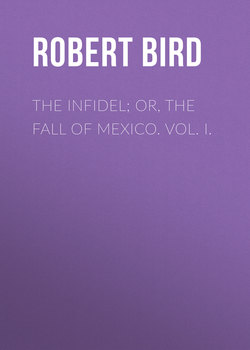The Infidel; or, the Fall of Mexico. Vol. I.

Реклама. ООО «ЛитРес», ИНН: 7719571260.
Оглавление
Robert Bird. The Infidel; or, the Fall of Mexico. Vol. I.
CHAPTER I
CHAPTER II
CHAPTER III
CHAPTER IV
CHAPTER V
CHAPTER VI
CHAPTER VII
CHAPTER VIII
CHAPTER IX
CHAPTER X
CHAPTER XI
CHAPTER XII
CHAPTER XIII
CHAPTER XIV
CHAPTER XV
CHAPTER XVI
CHAPTER XVII
CHAPTER XVIII
CHAPTER XIX
CHAPTER XX
CHAPTER XXI
Отрывок из книги
The traveller, who wanders at the present day along the northern and eastern borders of the Lake of Tezcuco, searches in vain for those monuments of aboriginal grandeur, which surrounded it in the age of Montezuma. The lake itself, which not so much from the saltness of its flood as from the vastness of its expanse, was called by Cortes the Sea of Anahuac, is no longer worthy of the name. The labours of that unhappy race of men, whose bondage the famous Conquistador cemented in the blood of their forefathers, have conducted, through the bowels of a mountain, the waters of its great tributaries, the pools of San Cristobal and Zumpango; and these, rushing down the channel of the Tula, or river of Montezuma, and mingled with the surges of the great Gulf, support fleets of modern argosies, instead of piraguas and chinampas, and expend upon foundering ships-of-war the wrath, which, in their ancient beds, was wasted upon reeds and bulrushes. With the waters, which rippled through their streets, have vanished the numberless towns and cities, that once beautified the margin of the Alpine sea; the towers have fallen, the lofty pyramids melted into earth or air, and the palaces and tombs of kings will be looked for in vain, under tangled copses of thistle and prickly-pear.
The royal city of Tezcuco is now, though the capital of a republican state, a mean and insignificant village. It was originally the metropolis of a kingdom once more ancient and powerful than that of Mexico; and which, when it had shared the fate of all others within the bounds of Anahuac, and acknowledged the sway of the Island Kings, still preserved the reputed, and perhaps the real possession of superior civilization. Its princes, in becoming the feudatories, became also the electors, of Mexico; and thus added dignity to an independence which was only nominal. The polished character of these barbarous chieftains, as the world has been taught to esteem them, may be better understood, when we know, that they sowed the roadside with corn for the sustenance of travellers, and the protection of husbandmen, built hospitals and observatories, endowed colleges and formed associations of literature and science, in which, to compare small things with great, as in the learned societies of modern Europe and America, encouragement was given to the study of history, poetry, music, painting, astronomy, and natural magic. The various mechanical trades were divided into corporate bodies, and assigned, each, to some particular quarter of the city; courts and councils were regularly established, and the laws which they dispensed, digested into uniform and written codes, some of which are still preserved. The kings of Tezcuco themselves mingled in the generous rivalries which they fomented: there are still in existence, – at least, in the form of translation, – several of the odes of Nezahualcojotl, a royal Tezcucan poet; and his hymns to the Creator, composed half a century before the advent of the Spaniards, were admired and chanted by the Conquerors, until devoted by misjudging and fanatical missionaries to the flames which consumed the written histories and laws of the kingdom, as well as the idolatrous rituals of the priests, with which last the others were unfortunately confounded.1
.....
"Right!" cried Guzman; "the Alguazil will be presently in his own stocks, if thou dost heat him into a quarrel. We are not forbidden to abuse one another. Let the red jackalls pass by unnoticed; we have mirth enough among ourselves, – we will worry our Immortality. Look, Najara, man; dost thou not see in what perplexity of cogitation he is involved, – yonder dull Bernal? Rouse him with a quip, now; pierce him with a jest. Come, stir; rub thy nose, make thy wit as sharp as a goad, and prick the ox out of his slumber."
"Ay, good Corcobado," cried Villafana, turning from the procession, and mischievously eyeing their solitary and abstracted companion, "fling out the legs of thy understanding, like a rough horse, and see if thou canst not strike fire out of his flinty brain. All the scratching in the world will not do it."
.....